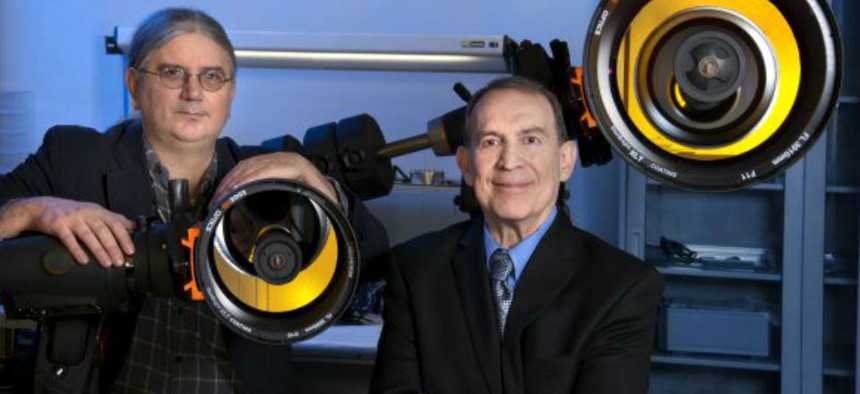The U.S. Army Says It Can Teleport Quantum Data Now, Too

Army Research Laboratory quantum researchers Ronald Meyers (right) and Keith Deacon (left) demonstrated teleportation using entangled photons. Army Research Lab
This kind of tech has implications that extend beyond the battlefield.
Quantum computing could revolutionize the way we interact with information. Such systems would process data faster and on larger scales than even the most super of supercomputers can handle today. But this technology would also dismantle the security systems that institutions like banks and governments use online, which means it matters who gets their hands on a working quantum system first.
Just last week I wrote about how a team of researchers in the Netherlands successfully teleported quantum data from one computer chip to another computer chip, a demonstration that hinted at a future in which quantum computing and quantum communications might become a mainstream reality.
That still seems a long way off—physicists agree that transmitting quantum information, though possible, is unstable. And yet! The U.S. Army Research Laboratory today announced its own quantum breakthrough.
A team at the lab's Adelphi, Maryland, facility says it has developed a prototype information teleportation network system based on quantum teleportation technology. The technology can be used, the Defense Department says, to transmit images securely, either over fiber optics or through space—that is, teleportation in which data is transmitted wirelessly.
The DoD says it can imagine using this kind of technology so military service members can securely transmit intelligence—photos from "behind enemy lines," for instance—back to U.S. officials without messages being intercepted.
But this kind of technological advance, especially in a government-run lab, is significant for the rest of us, too. Quantum computing would offer unprecedented upgrades to data processing—both in speed and scope—which could enhance surveillance technologies far beyond what exists today.
"That's why the NSA in particular is so interested in quantum computers and would like to have one," the physicist Steve Rolston told me last week, "and probably would not tell anyone if they did."
NEXT STORY: White House Comms from Down Under





